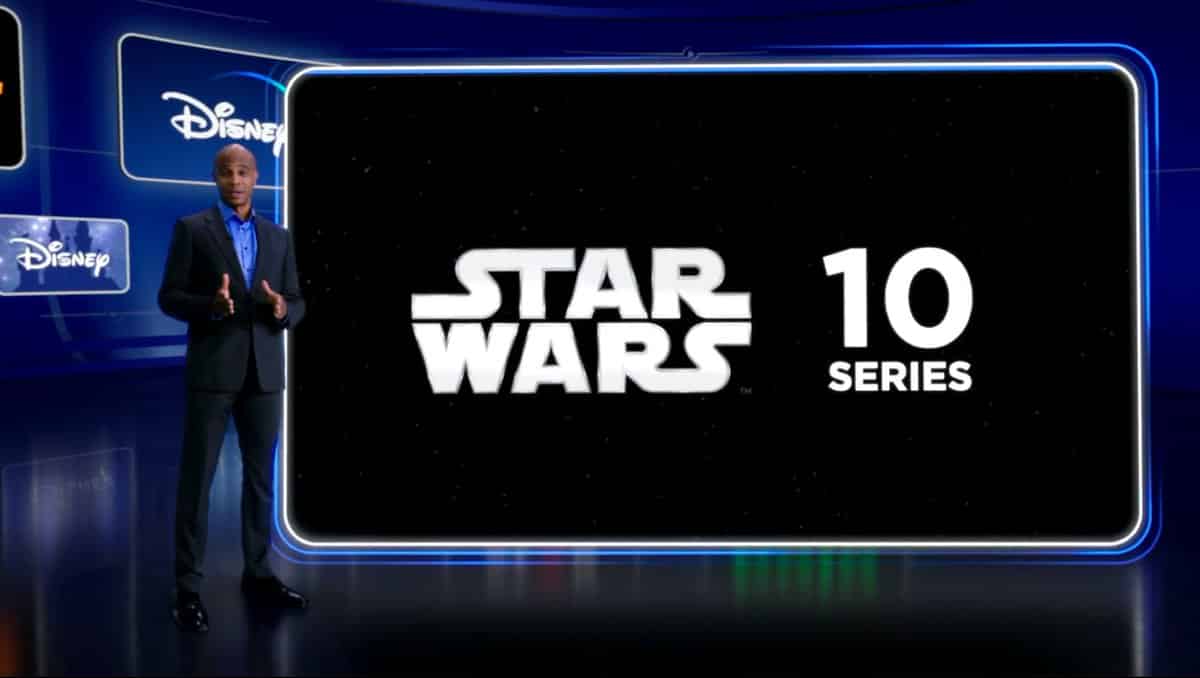Last week on its investors call that was essentially about Disney+, Disney dropped so many announcements that it really seemed like people didn’t know what to do. The House of Mouse delivered an all-out blitz of news that would normally destroy the internet but instead was so much information that people almost seemed to glaze over it in a state of awe. Announcements that normally would have torn through the web, like the casting of Thor: Love and Thunder‘s villain or the fact that Hayden Christensen is returning to play Darth Vader, practically slipped by underneath a massive title wave of content announcements. It was an unprecedented bombardment of franchise content, and it kicked off with the announcement that over the next few years Disney+ will be home to 10 new Marvel shows and 10 new Star Wars shows.
That sure sounds exciting and the investors on the call must be seeing dollar signs all over the place, but it’s also the kind of thing that could easily backfire on Disney+ and, eventually, devalue the content it is hoping will continue to pull new people in. While Disney+ will be home to plenty of other more traditional content like most of Disney’s future live-action adaptations of its classic animations, animated movies, and Pixar films, the true message of the call was loud and clear: We have Marvel and Star Wars and we’re going all in. It may not work.

It is, of course, easy to understand why Disney sees Marvel and Star Wars as the future of Disney+. Launching a streaming service isn’t easy even if you already have a massive library of successful content and iconic characters. Just ask WarnerMedia as HBO Max continues to struggle or CBS All Access, which is in the middle of a rebranding because it forgot to put a “+” in its name.
Unless you’re a niche streamer like Shudder or Crunchyroll, you need a massive amount of new content appealing to a wide array of people to continue subscriber growth. You need to put out enough content that you get multiple hits a year to maintain those subscribers, and you need to be able to throw enough crap at the wall that eventually something sticks, even if it’s the last thing you think will (see: a show about chess becoming Netflix’s biggest series ever). You need that content to not just be successful on your platform but in the cultural zeitgeist. It needs to move outside your service so that others will be enticed to subscribe. In short, you need content, you need it to be good, you need it consistently, and you need people to talk about it.
For Disney, it needs Baby Yoda or Hamilton, but it needs that year-round. That makes Star Wars and Marvel incredibly enticing to turn to because Disney+ features a lot of what they need already built-in. Those two franchises alone are two of their biggest moneymakers, and they have devoted fanbases that will tune in and pay predictably. The Mandalorian has already proven that Star Wars pulls subscriptions for the service, and the hype around Marvel’s shows is real. That’s streaming gold right there, and it’s shown with 86.8 million subscribers on Dec. 2, a skyrocketing growth from its launch of 10 million a year ago that any other streaming platform outside of Netflix would kill for.

If you think the Nintendo 3DS printed money, then these brands created the very idea of money. What Disney has learned very clearly is that if you want to pull in subscribers and keep yourself relevant, then pumping out content for these franchises seems like the easy solution. And it will probably work… until it doesn’t.
That’s a lesson you’d think Disney would have already learned considering it is exactly what happened with the Star Wars films after it bought the franchise. Disney’s Star Wars movies came out the gate hard with Star Wars: The Force Awakens, making massive amounts of cash and generally being accepted by the fandom. However, the studio began pumping films out with abandon looking to recapture the magic of the MCU, and the franchise suffered because of it. Quality dipped (We can argue about which films weren’t good elsewhere.) and it all felt forced. There was just too much going on, and people began turning away, especially with the “flop” of Solo: A Star Wars Story and the eventual shunning of the terrible Star Wars: The Rise of Skywalker. This commitment to 10(!) new Star Wars shows seems a lot like that.
Marvel, meanwhile, is the king of continued success and as such is far less likely to crash and burn. Comics, however, give us some insight into what happens when you extend and expand a brand for too long. It just gets to be too much content; your world becomes so convoluted that there’s no point of entry for anyone who hasn’t committed the last decade to keeping up. Ten new shows, all directly connected to the movies, sounds like a lot of content and a lot of keeping up. It’s the kind of thing that could definitely trigger a turn away from the MCU.

Now, there are some caveats here. Disney+’s Star Wars efforts are different from the cinematic ones. The series aren’t all live-action, they’re moving further away from the Skywalker saga, and, like The Mandalorian, they’re giving fans what they want more often than not. If the quality and variety stay high, then this flood of content can keep fans interested. That’s the way Marvel has worked all these years as well — varying its content just enough to be different while ultimately still being the same. If the likes of the decidedly weird-looking WandaVision or the final season of The Clone Wars are any indication, Disney seems to know how to do that now.
That only applies to the fans, though.
The event was an investor conference for all of Disney+, and while there were a few big non-Marvel / Star Wars announcements, one could easily come away from it thinking the event was basically about those two franchises. To continue to grow, Disney needs more than just these two franchises on the platform. It needs content that speaks to a wide variety of viewers, not just those interested in this “nerdy” content. For many, Disney’s all-out push on these two franchises will turn Disney+ into “that Star Wars platform” or “that Marvel streamer,” and those people won’t dive in. This doesn’t expand their base at all and could, if the above negative outcomes come true, begin to shrink it.

We can take a look at Netflix, the most successful streaming company there is. That’s not just because it was first; it’s because it dumps content that appeals to everyone out at a nonstop pace. I, a professional film and TV journalist who writes about this stuff daily, sometimes flip Netflix on and see a show or movie I’ve never even heard of premiering. Looking at my wife’s and my accounts, (I’m not tarnishing my recommendations with The Christmas Prince.) you wouldn’t be remiss in thinking that we’re on two different streaming platforms altogether. This is because Netflix quite literally tries to do everything.
It also tries to do it somewhat originally. Whether by the necessity of the fact that all the IP owners Netflix worked with now have their own streaming platforms (See Marvel.) or out of a desire to create original content, Netflix puts out a ton of content that isn’t connected to any franchise at all — and it’s usually its most successful. That’s the kind of content that pulls new viewers in because it’s something they haven’t made their mind up about yet. By committing so heavily to franchises, Disney isn’t providing that variety or type of content, and it’s going to make it hard to pull in new viewers. In the long term, Disney needs to take a serious look at what it wants Disney+ to be, especially if it’s going to be the focus of its entertainment arm from here on out.
Look, it’s Marvel and Star Wars. The chance of this making Disney a lot of money and pulling in a ton of Disney+ subscribers is good. There’s also the fact that no one needs to worry about Disney making money; it’s going to do that. No one needs to feel sorry for the monolithic corporation controlling most of our pop culture if it messes up here. However, for the fans of these franchises and characters, it may be rough going as Disney begins to squeeze out more and more juice from fruits that might not provide them any longer. Let’s hope its commitment to quality is as big as its commitment to quantity, or we’re looking at what could be another downfall for Star Wars and the beginning of the end for Marvel.






Published: Dec 17, 2020 01:00 pm